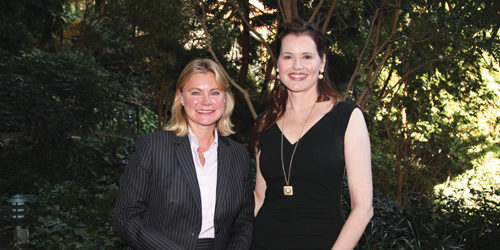
By Maarten Hoffmann
Justine Greening took on the difficult portfolio of Secretary of State for Education and Minister for Women and Equalities upon the election of Theresa May as Prime Minister and has been in post since July 14th 2016.
Greening was first elected as an MP for Putney in 2005 and, in 2013, was listed as one of the most powerful women in the UK by the BBC. Her first post was Economic Secretary to the Treasury in 2010, then Secretary of State for Transport in 2011 before her appointment as Secretary of State for International Development.
Greening was born in Rotherham, where she attended Oakwood Comprehensive School. She studied Business Economics and Accounting at the University of Southampton, graduating with a first class honours degree in 1990. She obtained an Executive MBA from the London Business School in 2000 and, before entering parliament, she qualified as an accountant and worked with PricewaterhouseCoopers, GlaxoSmithKline and Centrica.
She has also spoken in favour of creating new grammar schools and retaining university tuition fees which, although antagonistic to many, will cost £100 billion to remove and this will always need to be considered.
In 2016, Greening followed Donald Trump on revealing her life on-line and announced on Twitter that she was in a “happy same-sex relationship”, making her one of the very few openly LGBT members of the Cabinet. Referring to the EU membership referendum, she added: “I campaigned for Stronger In but sometimes you’re better off out! She was previously in a relationship with Mark Clarke, the former director of the Young Britons’ Foundation and parliamentary candidate in Tooting, who was banned from the party for his involvement in a bullying scandal in Conservative Future.
Greening is not only breaking the Tory mould by being the daughter of working class steel workers from Rotherham but she was also state educated and therefore some feel is the perfect candidate for the Education role.
So what has she achieved in her first year in post?
Following her appointment in July 2016, Ms Greening moved quickly to scrap a number of policies, including forced SATs re-sits for 11 year-olds and the controversial plan to force all schools in under-performing areas to become part of an academy chain.
While she initially followed suit in praising Ms May’s grammar school plans, later interviews with the Secretary of State revealed her personal difference in opinion.
Ms Greening was praised for seeing compulsory sex and relationships education pushed through for all schools, and is also known to have a good relationship with teaching unions – despite being heckled over the grammar schools pledge at the Association of School and College Leaders conference in March.
Russell Hobby, general secretary of school leaders’ union NAHT, said he welcomed her reappointment. “In the last few months she has shown a willingness to engage with the profession on important issues, such as primary assessment and PSHE, paving the way for crucial changes in policy,” he said.“NAHT has worked well with the minister on the current consultation on primary assessment, and we look forward to continuing that to drive through the positive changes this contains. The biggest challenge for the minister will be school funding and she will need to argue vigorously for the needs of schools with her cabinet colleagues,” he added.
Since the Tories lost their majority in the election vote, it remains unclear which education policies will be put forward, if any, in the coming weeks and months.
Speaking on the BBC’s Sunday Politics programme, Graham Brady, chair of the 1922 Committee of backbench Tory MPs and a prominent supporter of grammar schools, said the party would have to “trim down our policies carefully to what we think Parliament will support”.
Another source close to Downing Street was reported to have admitted the controversial grammar schools plans were “dead” thanks to Ms May’s lost majority.
Others have speculated that the department will have no choice but to reassess school spending, following increasing pressure from school leaders and a series of budgeting blunders. Teaching unions warned that if the Government decides to press ahead with cuts to school spending – calculated at a real-term loss of 7% per pupil – campaign efforts would “intensify” – hinting that strike action could be on the horizon.
Greening has promised £1.3bn in funding for schools in England to head off a Conservative revolt, raiding the budget for free schools and new buildings to pay for the rise. She said schools would get the bailout over the next two years, after complaints from Conservative MPs that Theresa May’s failure to deal with concerns about struggling schools cost the government its majority at the election.
The education secretary pitched the £1.3bn as an increase above inflation in the core schools budget in 2018 and 2019. But it quickly emerged that the money was being diverted from other parts of the education budget, rather than new cash from the Treasury.
In a partial compromise, Greening also announced a delay in the full implementation of the controversial new national funding formula, which means some schools will get more money and some lose cash per pupil in real terms. Under the plans, the new formula would only be indicative for its first two years in 2018 and 2019, with local authorities getting discretion over how to distribute the money during that time.
Greening had argued in the cabinet for more money to pay for schools struggling with their budgets from the Chancellor Philip Hammond, amid stories about some headteachers begging parents for extra cash, cutting lunch breaks and dropping minority subjects.
But she ended up having to find the cash from the Department for Education’s own budget out of efficiency savings, leading to accusations from opposition MPs that she was robbing Peter to pay Paul.
The bulk of the cash will come from an unidentified £600m of new cuts to the central Department for Education budget. A further £200m will come from the free schools budget by building 30 out of a planned 140 local authority schools instead. She will also take £420m from the capital budget for building and repairs, mostly from the “healthy pupils” funding for sports facilities and wellbeing. It comes at a time when May and Hammond are under pressure from some cabinet colleagues to ease austerity, after fearing the election result was a response to falling standards in public services.
Greening is one of the few cabinet ministers to have raised her profile since the election, signalling she would like an end to the 1% pay cap for teachers. However, so far, Hammond has won the arguments for maintaining fiscal discipline until the next budget at least and challenged his colleagues to come up with ways of paying for any extra spending outside of taxation or borrowing.
The Department for Education has been facing questions over where it will get the funding to pay for its plans, after it reversed a manifesto pledge to scrap universal free school meals for infants. But Greening did partly explain how she would would pay with the controversial changes to the so-called “national funding formula” that redistributes money between well funded and underfunded schools. She promised funding would increase overall in real terms but some schools will see increases of just 0.5% on a per pupil basis while others will see their budgets go up by as much as 3%, creating winners and losers.
The new announcement was designed to placate schools and teachers ahead of the summer holiday, but a number of MPs, including some Conservatives, still had concerns about unfairness in the system.
Angela Rayner, the shadow education secretary, said “They are not committing any new money and have not been clear about exactly what programmes they will be cutting to plug the funding black hole.”
Layla Moran, the Lib Dem education spokesman, said the announcement was a “desperate attempt to pull the wool over people’s eyes.”
Lucy Powell, the former shadow education secretary, also raised concerns that the £1.3bn would not be enough to ensure that schools do not lose per pupil funding in cash terms.
Headteachers who have been involved in a school funding campaign across 17 counties called Worth Less?, gave a cautious welcome to the education secretary’s announcement, but expressed frustration over delays to the introduction of the new funding formula and said the campaign would continue until all schools were adequately funded.
The heads, who have been criticised for campaigning alongside parents against funding cuts, said in a statement: “As ever, it will be vital to examine the precise details carefully. Crucially, schools and families need to know what the announcement means in real terms for every pupil in our care.”
Ian Hudspeth, spokesman for the County Councils Network, which includes many authorities whose schools have been historically underfunded, said: “It is imperative that government does not simply provide an uplift in basic per-pupil funding, as this would not address these historic inequities that have built up. Instead, it should seek to implement a baseline of funding that will allow each school to be sustainable in the long-term.”
So, Justine Greening has her hands full and had better enjoy the Parliamentary recess whilst she can as the Autumn will bring her a wealth of problems and only then will we see if she is up to the job.
In addition to the lack of privilege from her upbringing, Greening can also claim to have real world business experience, unlike so many politicians. She tells the story of one of her first job interviews with an investment bank. The Education Secretary said she made the faux pas when having lunch as part of a job interview for an investment bank. Because the menu had been written in Italian, bosses had expected her to be ‘confident’ enough to speak in that language. The politician, who was a young graduate at the time, realised too late she had ‘failed a test’ and was shunned for the post. She added the episode was an example of ‘unconscious bias’ against candidates from working class backgrounds, who may not have the same ‘polish’ as their more advantaged peers.
Speaking at the launch of the first Social Mobility Index of employers, she said more companies needed to attract candidates from a wide range of backgrounds.
She said it was about ‘changing attitudes’ within companies. Recalling the incident, she said: “The interview was fine, and then I got taken out to lunch by two of the junior managers in this investment bank. I remember trying to work out whether I should order the meal in Italian… or whether I should read the English translation underneath. In a split second, I decided I’m a non-pompous person, I will just read the English. And I could tell with the body language that I had just failed a test.
“Because I was meant to have had the confidence, apparently, I think, to have just said it in Italian. It wasn’t that I didn’t have confidence – I absolutely had lots of confidence as a person. But I just had a different attitude as to how I felt it was appropriate to behave. I had a sense of it being a test I had failed, not because I wasn’t going to do a great job at that company, but because I came from a different place and had a different attitude to that situation,” she said. “These are the small things that add up to big differences in terms of whether or not in the end people, I think, get opportunities.”
She said she had been just one of many graduates who had ‘received the sharp end of unconscious bias’ because of their accent or behaviour. The Index, compiled by the Social Mobility Foundation, ranks employers on opportunities they provide for poorer applicants. The top three companies this year are accountancy firms Grant Thornton and KPMG and construction giant Skanska. Theresa May has vowed to help those from disadvantaged backgrounds get into top universities and firms.
Greening is also outspoken about ‘gender fluidity’ and same sex marriage. She has stated that the Church of England should ‘keep up’ with modern society and drop its opposition to gay marriage while same-sex couples have been able to have civil weddings since 2013, the law still bars them from doing so in Anglican churches and suggested it was now time that the CofE allowed its vicars to bless homosexual unions.
“I think it is important that the church in a way keeps up and is part of a modern country. I wouldn’t prescribe to them how they should deal with that but I do think we are living in a country where people broadly recognise that attitudes are in a different place now to where they were many, many years ago. We have allowed same sex marriage, that is a massive step forward for the better and for me, I think people do want to see our major faiths keep up with modern attitudes in our country.”
The Prime Minister joined in and also urged the Church to consider how attitudes had changed. And Commons Speaker John Bercow also said last week that gay people should be able to ‘bloody well’ get married in church if they wanted to. John Bercow’s comments were controversial as he is supposed to be politically neutral but as he has not been during his entire tenure, l am not sure it is wise to expect anything else from him.
Greening has also announced plans to reform the Gender Recognition Act, previously described as “invasive” by Jeremy Corbyn. The Equalities Minister confirmed plans to make the process, described as “demeaning and broken” by Stonewall, easier by removing the need for a medical diagnosis of gender dysphoria before applying for your gender identity to be recognised. There are also proposals to make the process shorter. “This government is committed to building an inclusive society that works for everyone, no matter what their gender or sexuality and today we’re taking the next step forward,” said Greening.
The announcement was condemned by Mary Douglas, a board member of the Grassroots Conservatives activist group, on Radio 4’s Today programme recently. She argued that some may enter the decision to have their gender changed on documentation too flippantly if the process was made easier. “If somebody thinks they have a mismatch between the way they think and the way their body is, the question is which should be changed?” said Douglas. Maria Miller, the chair of the Women and Equalities Committee, had no truck with Douglas’ line of argument, saying “there was no evidence that anybody would take changing their gender casually at all.” “This is one of the most marginalised groups in our society,” added Miller, “and I think the government should be applauded.”
Again, we have a Tory government fiddling on the sidelines whilst Rome burns. Cameron did it with gay marriage - although a very worthy subject, it was only tackled to deflect attention away from other hot button issues, such as the economy and Brexit, rather than out of heart felt commitment to the subject. Let us hope that the gender fluidity issue is not yet another distraction from the vital matter at hand - that of proper funding for our schools. With Greening, there is hope that her background and open outlook will make it possible to forge ahead and fix our education system once and for all but as long as Hammond has the purse strings, few would bet on it.
She further commented on her education: ”If you’d asked my teacher or William Hague’s teacher just down the road on the other side of Rotherham whether, in their two comprehensive schools, they thought they’d be teaching two cabinet ministers, they wouldn’t have thought they were. It still shows you can get somewhere in Britain if you knuckle down. But it was bloody hard work. One of the reasons I am a Conservative is that I believe in effort and reward, and linking them. But I also believe in making sure that the ladder people climb up is there for them and they are encouraged to climb up it to whatever level they want to be at.”
So there might be a hope that Justine Greening will get it right as surely, one of the biggest problems in education is the constant fiddling by every new government that comes to power. The education of the next generation is not a game or a political football to be booted back and forth across the dispatch box. It is the key issue on whether the United Kingdom continues to grow as a society. Every five years we elect a new government and some bright spark comes up with a new way of educating our children. It is time a policy was put in place, in close collaboration with head teachers, that outlasts every government. It is time education was removed from the remit of government and placed in the hands of the front line workers - the teachers.
As the leading business magazine in the UK, we often hear comments from businesses about the poor standard of job candidates, their lack of understanding of what business requires of them, their lack of basic skills, their lack of awareness of what work entails. This is not the fault of the schools or the teachers. This is the fault of a government that treats education as a budget drain and and a party political issue.
Education, education, education. This mantra must be observed. The children are the future and their education should be at the top of every political agenda and teachers’ pay should be increased without delay to reflect the responsibility they carry for that future.
Without a well educated workforce, any society is doomed to failure.






